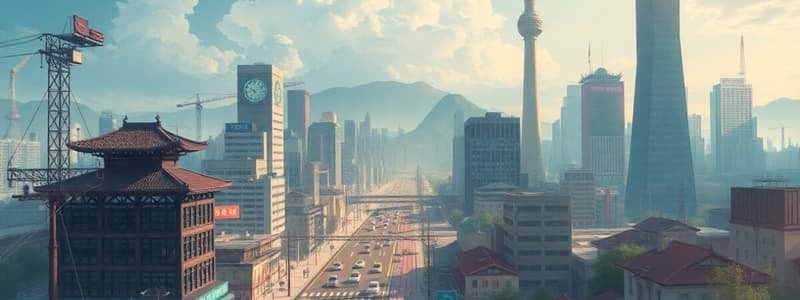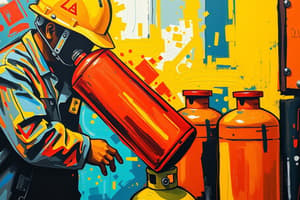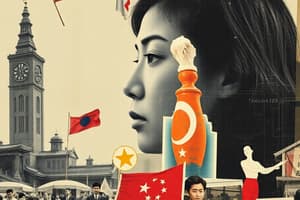Podcast
Questions and Answers
What characterizes compressed modernity in South Korea?
What characterizes compressed modernity in South Korea?
- Gradual societal changes over centuries
- Isolation from international influences
- Rapid and condensed changes across various domains (correct)
- Consistent historical and social development
What is the first dimension of compressed modernity?
What is the first dimension of compressed modernity?
- Technological advancement
- Time condensation/abridgement (correct)
- Cultural diversity
- Space condensation/abridgement
Which of the following best describes the effect of American military occupation on South Korea's modernization?
Which of the following best describes the effect of American military occupation on South Korea's modernization?
- It caused a delay in economic development.
- It facilitated an immediate adoption of modern institutions. (correct)
- It hindered modern institution adoption.
- It had no significant impact on societal changes.
How did space condensation manifest in South Korea during the 1990s?
How did space condensation manifest in South Korea during the 1990s?
What was one outcome of compressed growth in South Korea?
What was one outcome of compressed growth in South Korea?
What effect did industrialization have on Korean cities?
What effect did industrialization have on Korean cities?
What drives the construction of a highly complex and fluid social system in compressed modernity?
What drives the construction of a highly complex and fluid social system in compressed modernity?
In what manner was South Korea's architectural development during modernization influenced?
In what manner was South Korea's architectural development during modernization influenced?
What triggered the Gwangju Uprising in 1980?
What triggered the Gwangju Uprising in 1980?
Which demographic primarily participated in the Gwangju Uprising?
Which demographic primarily participated in the Gwangju Uprising?
What significant event occurred on May 27th during the Gwangju Uprising?
What significant event occurred on May 27th during the Gwangju Uprising?
Who was a key figure in the June Democracy Movement of 1987?
Who was a key figure in the June Democracy Movement of 1987?
Which policy was introduced by Kim Dae-jung during his administration?
Which policy was introduced by Kim Dae-jung during his administration?
Which of the following amendments occurred during the June Democratic Uprising of 1987?
Which of the following amendments occurred during the June Democratic Uprising of 1987?
What was the estimated death toll during the Gwangju Massacre?
What was the estimated death toll during the Gwangju Massacre?
What event triggered the April Revolution in 1960?
What event triggered the April Revolution in 1960?
What action did police and military forces take by April 25, 1960, during the April Revolution?
What action did police and military forces take by April 25, 1960, during the April Revolution?
What significant amendment was made to the South Korean constitution in 1952?
What significant amendment was made to the South Korean constitution in 1952?
What was one significant outcome of the April Revolution?
What was one significant outcome of the April Revolution?
Which administration governed South Korea from 1948 until 1960?
Which administration governed South Korea from 1948 until 1960?
Which event marked the beginning of Park Chung-hee’s rule?
Which event marked the beginning of Park Chung-hee’s rule?
What concern did South Koreans have regarding their economic position?
What concern did South Koreans have regarding their economic position?
Which of the following accurately reflects the political context of South Korea during Rhee Syngman's rule?
Which of the following accurately reflects the political context of South Korea during Rhee Syngman's rule?
What was a key feature of Park Chung-hee's economic policy?
What was a key feature of Park Chung-hee's economic policy?
During which period did Korea experience a per capita growth in national income from $85 to $1971?
During which period did Korea experience a per capita growth in national income from $85 to $1971?
How did the South Korean economy benefit during the period of compressed modernity?
How did the South Korean economy benefit during the period of compressed modernity?
What was a significant change introduced by the second amendment in 1954?
What was a significant change introduced by the second amendment in 1954?
What industries did Korea primarily focus on during the initial stages of the economic development under Park Chung-hee?
What industries did Korea primarily focus on during the initial stages of the economic development under Park Chung-hee?
What was a key aspect of the 'late development/dependent modernization' experienced by South Korea?
What was a key aspect of the 'late development/dependent modernization' experienced by South Korea?
What aspect of Park Chung-hee's governance involved continuous adjustments to maintain control?
What aspect of Park Chung-hee's governance involved continuous adjustments to maintain control?
What was the initial approach to presidential elections in South Korea before the 1952 amendment?
What was the initial approach to presidential elections in South Korea before the 1952 amendment?
What occurred as a result of the violent suppression of demonstrations during Park Chung-hee's rule?
What occurred as a result of the violent suppression of demonstrations during Park Chung-hee's rule?
What was the primary outcome of the forced skewed insertion into modernity in Korea?
What was the primary outcome of the forced skewed insertion into modernity in Korea?
How did the Cold War influence South Korea's modernization?
How did the Cold War influence South Korea's modernization?
In what year did the Rhee Syngman Administration introduce the first amendment for presidential elections?
In what year did the Rhee Syngman Administration introduce the first amendment for presidential elections?
Who succeeded Park Chung-hee and continued his economic development strategy?
Who succeeded Park Chung-hee and continued his economic development strategy?
What was a primary concern for South Korea in the context of international political economy?
What was a primary concern for South Korea in the context of international political economy?
What characterized the approach to national development in post-war Korea?
What characterized the approach to national development in post-war Korea?
What role did the military-led state play in Korea's industrialization?
What role did the military-led state play in Korea's industrialization?
What was a significant driving force behind the postcolonial modernization efforts in Korea?
What was a significant driving force behind the postcolonial modernization efforts in Korea?
What issue arose from the catch-up development strategy employed by the state?
What issue arose from the catch-up development strategy employed by the state?
In what way did colonial oppression influence postcolonial leaders in Korea?
In what way did colonial oppression influence postcolonial leaders in Korea?
What is a consequence of the rushed modernization approach in Korea post-war?
What is a consequence of the rushed modernization approach in Korea post-war?
Which statement best describes the nature of modernization in Korea during the Cold War?
Which statement best describes the nature of modernization in Korea during the Cold War?
What was a characteristic of the cultural context during Korea's modernization?
What was a characteristic of the cultural context during Korea's modernization?
Flashcards
Compressed Modernity Definition
Compressed Modernity Definition
A rapid and concentrated process of economic, political, social, and/or cultural change, occurring over short periods in time and space, leading to a complex and shifting social system.
Time Condensation (Compressed Modernity)
Time Condensation (Compressed Modernity)
South Korea's rapid economic growth, transitioning from an agricultural to an industrial economy in a remarkably short time (decades, not centuries). This was unlike the Western experience.
Space Condensation (Compressed Modernity)
Space Condensation (Compressed Modernity)
The rapid urbanization and industrialization of South Korea, often imitating other countries, creating modern cities that can feel disconnected from traditional Korean culture.
External Influences on Compressed Modernity
External Influences on Compressed Modernity
Signup and view all the flashcards
Korean Urbanization
Korean Urbanization
Signup and view all the flashcards
Informatization and Globalization Impact (Compressed Modernity)
Informatization and Globalization Impact (Compressed Modernity)
Signup and view all the flashcards
Compressed Modernity and Alienation
Compressed Modernity and Alienation
Signup and view all the flashcards
Compressed Modernization and Asymmetrical Relations
Compressed Modernization and Asymmetrical Relations
Signup and view all the flashcards
Forced skewed insertion into modernity
Forced skewed insertion into modernity
Signup and view all the flashcards
Cold War modernization (Americanization)
Cold War modernization (Americanization)
Signup and view all the flashcards
Post-Korean War reconstruction
Post-Korean War reconstruction
Signup and view all the flashcards
Statist order and catch-up development
Statist order and catch-up development
Signup and view all the flashcards
Modernization instead of revolution
Modernization instead of revolution
Signup and view all the flashcards
Skewed modernization process
Skewed modernization process
Signup and view all the flashcards
Colonial oppression
Colonial oppression
Signup and view all the flashcards
Nationalist leaders
Nationalist leaders
Signup and view all the flashcards
Rapid industrialization
Rapid industrialization
Signup and view all the flashcards
Unattended and underdeveloped areas.
Unattended and underdeveloped areas.
Signup and view all the flashcards
Late Development/Dependent Modernization
Late Development/Dependent Modernization
Signup and view all the flashcards
Sequential Industrialization-Modernization
Sequential Industrialization-Modernization
Signup and view all the flashcards
Global Economic Restructuring
Global Economic Restructuring
Signup and view all the flashcards
Inter-national Product Cycles
Inter-national Product Cycles
Signup and view all the flashcards
First Republic of South Korea
First Republic of South Korea
Signup and view all the flashcards
Direct Election
Direct Election
Signup and view all the flashcards
Rhee Syngman Administration
Rhee Syngman Administration
Signup and view all the flashcards
Amendments to Election
Amendments to Election
Signup and view all the flashcards
Presidency Limits
Presidency Limits
Signup and view all the flashcards
South Korea's Position in Global Economy
South Korea's Position in Global Economy
Signup and view all the flashcards
April Revolution (1960)
April Revolution (1960)
Signup and view all the flashcards
May 16 Military Coup (1961)
May 16 Military Coup (1961)
Signup and view all the flashcards
Park Chung-hee's Administration
Park Chung-hee's Administration
Signup and view all the flashcards
Economic Growth under Park
Economic Growth under Park
Signup and view all the flashcards
Export-oriented industrialization
Export-oriented industrialization
Signup and view all the flashcards
3.15 Rigged Election
3.15 Rigged Election
Signup and view all the flashcards
Developmental state
Developmental state
Signup and view all the flashcards
Per Capita GNI
Per Capita GNI
Signup and view all the flashcards
Labor-intensive Industries
Labor-intensive Industries
Signup and view all the flashcards
Heavy Chemical Industries
Heavy Chemical Industries
Signup and view all the flashcards
Gwangju Uprising
Gwangju Uprising
Signup and view all the flashcards
5.18 Democracy Movement
5.18 Democracy Movement
Signup and view all the flashcards
Gwangju Massacre
Gwangju Massacre
Signup and view all the flashcards
June Democracy Movement
June Democracy Movement
Signup and view all the flashcards
1987 June Democratic Uprising
1987 June Democratic Uprising
Signup and view all the flashcards
Kim Dae-jung
Kim Dae-jung
Signup and view all the flashcards
Sunshine Policy
Sunshine Policy
Signup and view all the flashcards
Study Notes
Week 7: Compressed Modernity & Democracy Movement
- Focuses on South Korea's unique experience of modernization and democratic movements.
Compressed Modernity*
- A civilizational condition where economic, political, social, and/or cultural changes occur rapidly in a condensed timeframe, both temporally and spatially.
- This rapid change leads to the creation of a complex and fluid social system.
- South Korea's transition from a low-income agricultural economy to an advanced industrial economy occurred remarkably fast, within a span of several decades.
- This rapid development wasn't solely due to internal efforts but was heavily influenced by external forces like American military presence and asymmetrical international relations.
Five Dimensions of Compressed Modernity*
-
Dimension I (Time/Era): Condensation/Abridgement
- South Korea's rapid economic development, transitioning to advanced industrialization in a short time span, compared to Western experience
- Modernization achieved in merely over half a century, contrasting to the centuries-long processes in the West.
- Driven by asymmetrical international relations, exploiting the politico-military and cultural influence of America after the liberation.
-
Dimension II (Space/Place): Condensation/Abridgement
- Rapid urbanization and industrialization in Korea mirroring other countries, regardless of geographical distances.
- Urban development transformed into spaces alienated from indigenous culture.
-
Dimension III (Time/Era): Compression/Complication
- Coexistence of traditional, modern, and postmodern values and cultures in diverse time zones.
- Observed in the complex domains of ideology, culture, and non-material realms.
- South Korea grappled with the compression of historical milestones, interwoven into everyday life.
- Intense competition, collision, articulation, and compounding of modern and traditional elements shaped history.
-
Dimension IV (Space/Place): Compression/Complication
- Diverse social elements generated from different regional contexts coexist within the same time-space in Korea.
- Urban development prioritized over rural areas, resulting in imbalances within the country.
-
Dimension V (All-encompassing): Deals with how the social and cultural phenomena stemming from the other four dimensions shape further social and cultural elements in Korea.
-
Interconnectedness of past, present, and regional influences (e.g., Korea and the West).
Conditions of Compressed Modernity*
- Forced skewed insertion into modernity: Modernity was imposed on Korea, as seen by Japan's modernization efforts, leading to an accelerated but structurally distorted experience.
- Cold War as a modernization regime: US military protection and economic aid were central to Korea's modernization efforts.
- Civil war and post-war reconstruction: Rapid modernization efforts were necessary to recover from war damage, prioritizing national development.
- Statist order and catch-up development: The military-led state prioritized rapid industrialization, potentially at the expense of social and cultural harmony.
- Modernization instead of social revolution: The existing tradition was suppressed, and an effort to redefine 'modernization' was adopted as a nationalist project.
- Advantages and pitfalls of late development/dependent modernization: Korean development benefited from international political economy but faced challenges with dependency, notably from the rise of China.
Democracy Movement*
- Focuses on the different stages and key factors related to South Korea's democratic movements.
- Early movements, such as the April 19 Revolution (1960) and subsequent uprisings, are examined.
RHEE Syngman Administration
- South Korea's first republic from 1948-1960.
- Indirect elections were originally stipulated in the constitution.
- Later amendments in 1952 and 1954 led to direct elections and a ban on multiple presidential terms.
The April Revolution (1960)
- A student-led movement against the rigged 1960 election and President Rhee's dictatorship.
- It was a turning point in Korea's history, signaling the potential for social movements and the power of student mobilization.
Park Chung-hee Administration
- A military coup led to the Park Chung-hee's rule and subsequent 18-year dictatorial regime (1961-1979).
- Repeated constitutional amendments maintained his rule.
- Demonstrations against dictatorship were often violently suppressed.
Socioeconomic Foundations of Democracy
- Remarkable Economic Growth: Economic growth during Park Chung-hee's rule, focusing on industrial planning and export-oriented policies.
- Industrial Complexes: Industrial clusters promoted synergy, technological exchange, and economic growth.
- Higher Education: Education was instrumental in fostering a skilled labor force for rapid industrialization.
Student Movement in PARK's Presidency
- Student protests against the repressive policies were significant during the Park Chung-hee era.
- These efforts included the 1972 amendment and 6-year presidency without reappointment limit adjustments, triggering student movements, and subsequent protests.
The Labor Movement
- Labor movements played a vital role in South Korea's democratic journey, as social forces alongside students and intellectuals.
Gwangju Uprising (1980)
- A significant anti-authoritarian movement after a military coup that resulted in brutal suppression of protestors in Gwangju.
5.18 Gwangju Uprising in 1980
- A large-scale movement by university students and the general public protesting against the newly established military government.
June Democracy Movement (1987)
- Pro-democratic resistance movement in South Korea.
- Faced challenges with the very limited student movement with many aspects related to the highly repressive policies of the time.
- Student movements continued to grow, supported by many groups.
- Key social catalysts such as workers, and religious leaders.
Civil Administrations
- Focuses on civil administrations like the Kim Young-sam and Kim Dae-jung administrations, with their domestic policies and international relations.
- Included aspects like Sunshine Policies, and engagement with neighboring countries.
Candlelight Revolution
- A large-scale protest campaign protesting the Park Geun-hye government.
- Stemmed from various scandals related to the government and misrule.
- Protests were connected to social and political issues leading to the demand for genuine political change.
Group Paper and Presentation
- Provided instructions for group assignments on analyzing Korean movies based on provided frameworks like familism, inequality and gender, Confucianism, globalization, and other factors.
Studying That Suits You
Use AI to generate personalized quizzes and flashcards to suit your learning preferences.
Related Documents
Description
Explore South Korea's unique journey through compressed modernity and its democratic movements. This quiz delves into the rapid socio-economic changes that reshaped the country and the various factors influencing these transformations. Test your knowledge on the dimensions and impacts of modernization in South Korea.



